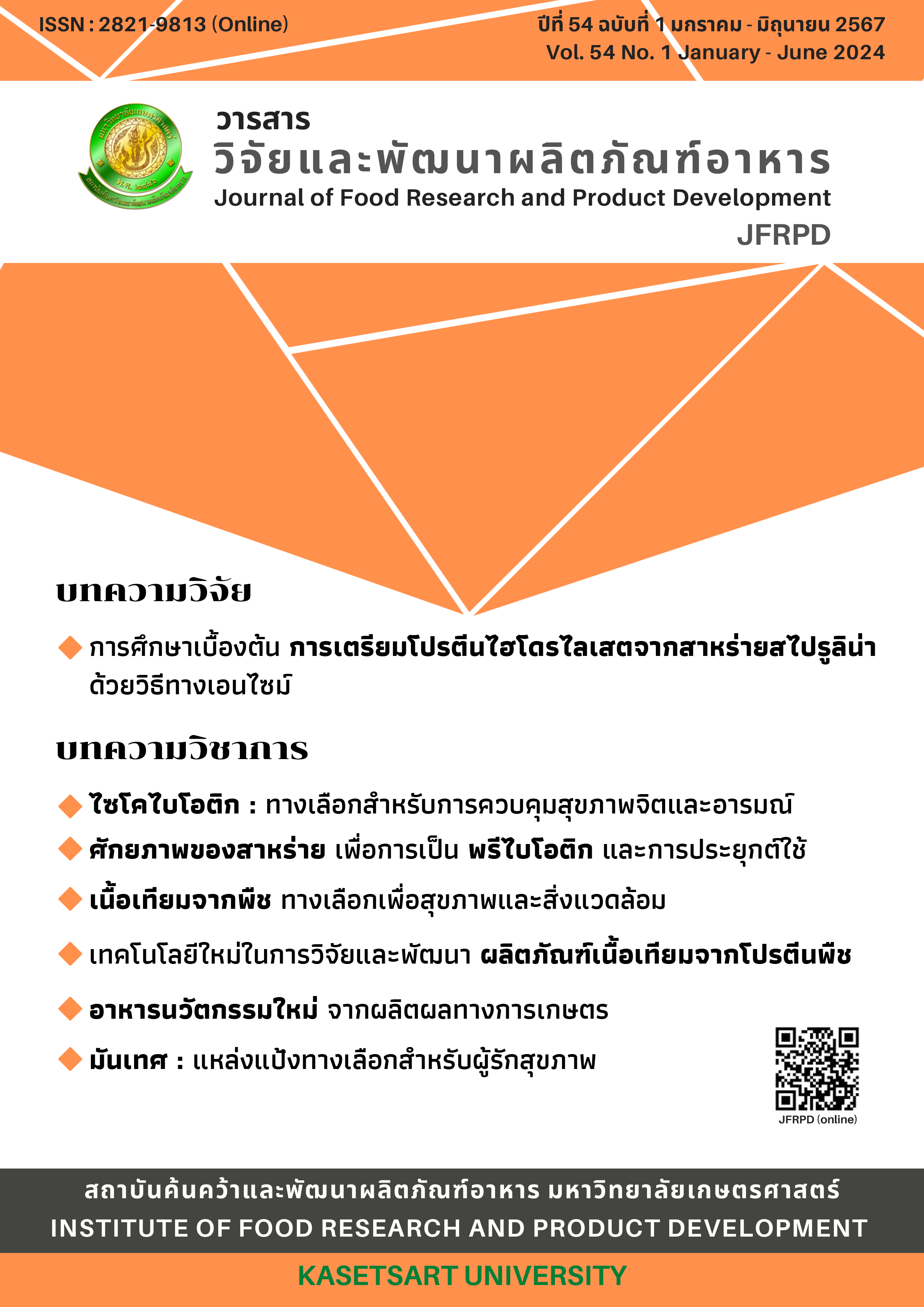ไซโคไบโอติกทางเลือกสำหรับการควบคุมสุขภาพจิตและอารมณ์
##plugins.themes.bootstrap3.article.main##
บทคัดย่อ
ไซโคไบโอติก เป็นจุลินทรีย์กลุ่มที่มีความสามารถในการควบคุมการส่งสัญญาณประสาทระหว่างจุลินทรีย์ลำไส้และสมอง แบบสองทิศทางระหว่างระบบประสาทส่วนกลาง (Central Nervous System, CNS) กับระบบทางเดินอาหาร ทำให้เกิดการเปลี่ยนสุขภาพจิตของมนุษย์เชิงบวกทั้งอารมณ์ ความวิตกกังวล และการรับรู้ ซึ่งการเปลี่ยนแปลงสมดุลไมโครไบโอมในลำไส้จึงเกี่ยวข้องกับสุขภาพสมองและมีผลกระทบต่อสุขภาพจิต การบริโภคไซโคไบโอติกในรูปของโพรไบโอติก เช่น Bifidobacteria และ Lactobacilli ส่งผลต่อสารสื่อประสาท (neurotransmitters) ในสมอง มีหลักฐานว่า ไซโคไบโอติกให้ผลดีต่อการรักษาสุขภาพจิต ทำให้ไซโคไบโอติกถูกใช้ในการบำบัดรักษาอาการทางจิตเวช เช่น ภาวะโรคซึมเศร้า ลดความเครียด ลดความวิตกกังวล บำบัดอาการนอนไม่หลับ เป็นต้น ประสิทธิผลของไซโคไบโอติกต่อสุขภาพจิตอาจแตกต่างกันไปขึ้นอยู่กับสายพันธุ์หรือการรวมกันของสายพันธุ์จุลินทรีย์ที่ใช้ ตลอดจนปัจจัยส่วนบุคคล เช่น องค์ประกอบของจุลินทรีย์ในลำไส้ที่เป็นพื้นฐานของบุคคล และสุขภาพโดยรวม
##plugins.generic.usageStats.downloads##
##plugins.themes.bootstrap3.article.details##

This work is licensed under a Creative Commons Attribution-NonCommercial-NoDerivatives 4.0 International License.
เอกสารอ้างอิง
Oroojzadeh P, Bostanabad SY, Lotfi H. Psychobiotics: the influence of gut microbiota on the gut-brain axis in neurological disorders. J Molecular Neurosci. 2022;72(9):1952–64.
Naidoo U. This is your brain on food: an indispensable guide to the surprising foods that fight depression, anxiety, PTSD, OCD, ADHD, and more (an indispensible anxiety, PTSD, OCD, ADHD, and more). Little, Brown Spark; 2020.
Dinan TG, Stanton C, Cryan JF. Psychobiotics: a novel class of psychotropic. Biological Psychiatry. 2013;74: 720-6.
Evrensel A, Ünsalver BÖ, Ceylan ME Psychobiotics. In: Frontiers in psychiatry. Springer; 2019. p565-81.
หนังสือพิมพ์ประชาชาติ. ทำความรู้จัก “ไซโคไบโอติกส์” (Psychobiotics) ผู้กำกับ อารมณ์ และ สุขภาพจิต เพื่อหลีกเลี่ยงสภาวะซึมเศร้า (วันที่ 14 กันยายน 2565) เข้าถึงได้จาก https://www.prachachat.net/public-relations/news-1048622
Parracho HMRT, Bingham MO, Gibson GR, McCartney AL. Differences between the gut microflora of children with autistic spectrum disorders and that of healthy children. J Med Microbiol. 2005; 54:987-91.
Bercik P, Collins SM, Verdu EF. Microbes and the gut-brain axis. Neurogastroenterol Motil. 2012; 24:405-413
Zmora N, Soffer E, Elinav E. Transforming medicine with the microbiome. Sci Transl Med. 2019; 11(477):eaaw1815.
Sarkar A, Lehto SM, Harty S, Dinan TG, Cryan JF, Burnet PWJ. Psychobiotics and the manipulation of bacteria–gut–brain signals. Trends Neurosci. 2016; 39(11):763-81.
Sengun IY, Kirmizigul A. 2020. Probiotic potential of kombucha. J Funct Foods. 2020; 104284.
Radavelli-Bagatini S, Sim M, Blekkenhorst LC, Bondonno NP, Bondonno CP, Woodman R, et al. Associations of specific types of fruit and vegetables with perceived stress in adults: The ausdiab study. Eur J Nutr. 2022;61(6):2929–38.
Pickering G, Mazur A, Trousselard M, Bienkowski P, Yaltsewa N, Amessou M, et al. Magnesium status and stress: the vicious circle concept revisited. Nutr. 2020;12(12):3672.
Al Sunni A, Latif R. Effects of chocolate intake on perceived stress; a controlled clinical study. Int J Health Sci (Qassim). 2014;8(4):393-401.
Majeed M, Nagabhushanam K, Arumugam S, Majeed S, Ali F. Bacillus coagulans MTCC 5856 for the management of major depression with irritable bowel syndrome: a randomized, double-blind, placebo controlled, multi-centre, pilot clinical study. Food Nutr Res. 2018;62(0).
ResearchAndMarkets.com The "psychobiotics market by psychotropic agent, by form, by application, and by region - global forecast to 2023-2033" offering. (Oct. 11, 2023)

